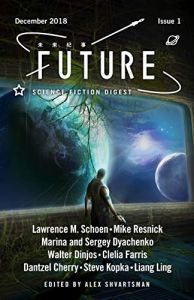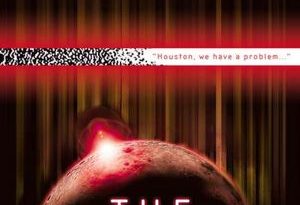Future Science Fiction Digest # 1 by Alex Shvartsman, Mike Resnick, Lawrence M Schoen, Marina and Sergey Dyachenko, Clelia Farris, Walter Dinjos, Dantzel Cherry, Steve Kopka and Liang Ling (emag review).
‘Future Science Fiction Digest’ is a new quarterly magazine featuring translations of international Science Fiction. It’s an oddity of the genre that the subject matter ranges across the universe but most of the well-known works come from the English-speaking world. The rest of planet Earth likes Science Fiction, too, and even writes good examples of it. There have been a few good anthologies of international SF but a whole magazine devoted to it is a welcome addition to the field. This first issue has fiction from China, the Ukraine, Nigeria, Italy and the United States.
It opens well with ‘The Rule Of Three’ by Lawrence M. Schoen, a first contact story. The alien doesn’t land on the White House lawn and say, ‘Take me to your leader’ (he must have seen twitter) but instead visits a remote Chinese mountain village populated by the Miao, an ethnic minority who live a simple life. A super-powered cross between Valentine Michael Smith (created by Heinlein circa 1960) and Henry David Thoreau (created by Mr. and Mrs. Thoreau circa 1816) he has some interesting ideas and the plot twists nicely along the way. Very enjoyable.
‘Sisi Mumu’ by Walter Dinjos postulates a future in which the elites live in space and the rest have dug into the Earth to avoid radiation sickness, mostly without success. However, the lower orders do have some useful skills, particularly mining and are taken to other planets to do the dirty work. One such is Nukosisi which has only one life-form, a gigantic tree. An interesting concept and a real human story of grief and adventure are beautifully combined in this fiction from a Nigerian author.
That Valentine Michael Smith fellow came to mind again in ‘The Emperor Of Death’, not because of the stranger’s original philosophy but for the circumstances of his birth. A team of highly talented married couples went on a space mission and he was born out there. When the ship returned, he was the only one left alive. A psychologist is sent to interview him after a number of odd events when the prodigy goes to school. This is well-written and disturbing. Authors Marina and Sergey Dyachenko are profiled afterwards by their translator Julia Meitov. She reveals that they produce literary stories where the ending is usually left unresolved like this one. That sometimes works but the masses and me prefer a bit of catharsis in our conclusions. Good story, even so.
Old hand Mike Resnick provides the issue with ‘Perfection.’ Zeph Is 6’ 2”’ perfectly proportioned, speaks eleven languages, knows fourteen computer languages and can lift four hundred pounds. He’s an android owned by billionaire Ephram Callahan. Fat and smelly, Ephram is the richest, most powerful man on the planet and decides he should have the perfect woman, the best in the world by which, he means the most beautiful. Brains and character are irrelevant. Zeph is tasked with finding her. This was highly amusing.
‘Wordfall’ by Liang Ling, translated by Nathan Faries and Zhao Li, is classic SF about a spaceship stranded on another world that meets strange aliens. The humans need to recharge their hydrogen tanks to get away. The frozen aliens stand stock still on the frozen landscape and get pelted with hot rocks. What a life! The ship’s captain has relationship difficulties with his teenage daughter and, with the help of a clever toy she owns, it all comes together nicely.
The above were my favourites but the also-rans were good too. ‘One Bad Unit’ by Steve Kopka is about Clutch, a man who works in nanotechnology, particularly security. The various applications that might be possible in fashion and cosmetics add interesting dressing to this boy meets girl story and there are some nice touches of humour.
‘The Substance Of Ideas’ is about two young people at a Kibbutz on another planet who discover a drug they can sell to the local townspeople. The original Italian prose of Clelia Farris is translated by Rachel Cordasco and has a pleasant lilt. I was reminded of Primo Levi and wondered if all Italian writing is so lovely in translation.
‘In All Possible Futures’ by Dantzel Cherry is about a man of one hundred and twenty years getting to the end of his life and being cared for by a pal, an AI that has protected him for years via clever use of prediction.
‘Future Science Fiction Digest’ has non-fiction, too. As well as the aforementioned profile of the Dyachenkos, there’s an interview with Javier Grillo-Marxvach and Jose Melina, TV writers and producers with a long list of credits that includes ‘Firefly’, ‘SeaQuest’ and ‘Agent Carter’. If you want to make money writing, kids, get into television.
The most interesting journalism is ‘A Vaccine For The Virus Of Empire’, a well-written and researched article by Phoebe Barton that I highly recommend even though I disagree with her. Phoebe protests the large presence of imperialism in SF books and films. She blames it on the Anglo-centric nature of the genre with its roots in the late British Empire and the American Empire of the 20th century. f you don’t think America has an empire read Vidal and Chomsky. Alas, empires are the norm for humanity, not a new phenomenon. From the Persian and Roman through to the Russian, Ottoman and British, it could be argued that history is the history of empires. I did a module on it as part of my degree. Science Fiction that assumes we will continue in the same vein is probably correct, no matter how beastly that is for good people. The best we can hope for is nice empires like Star Trek’s Federation.
This is a terrific first issue, highly recommended, and I hope it broadens the public taste and gets more people reading international Science Fiction.
Eamonn Murphy
January 2019
(pub: UFO Publishing. 226 page emag. Price: £ 3.18 (UK). ISBN: 123-0-00298-853-5)
check out website: www.ufopub.com






